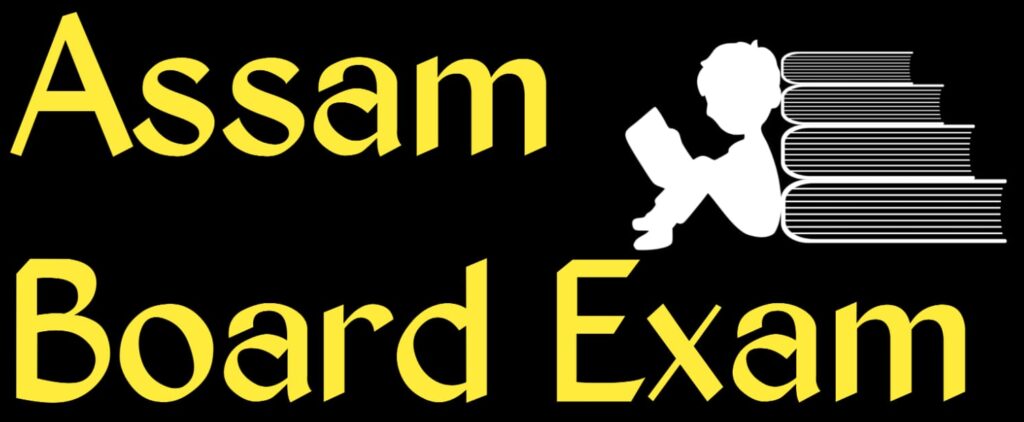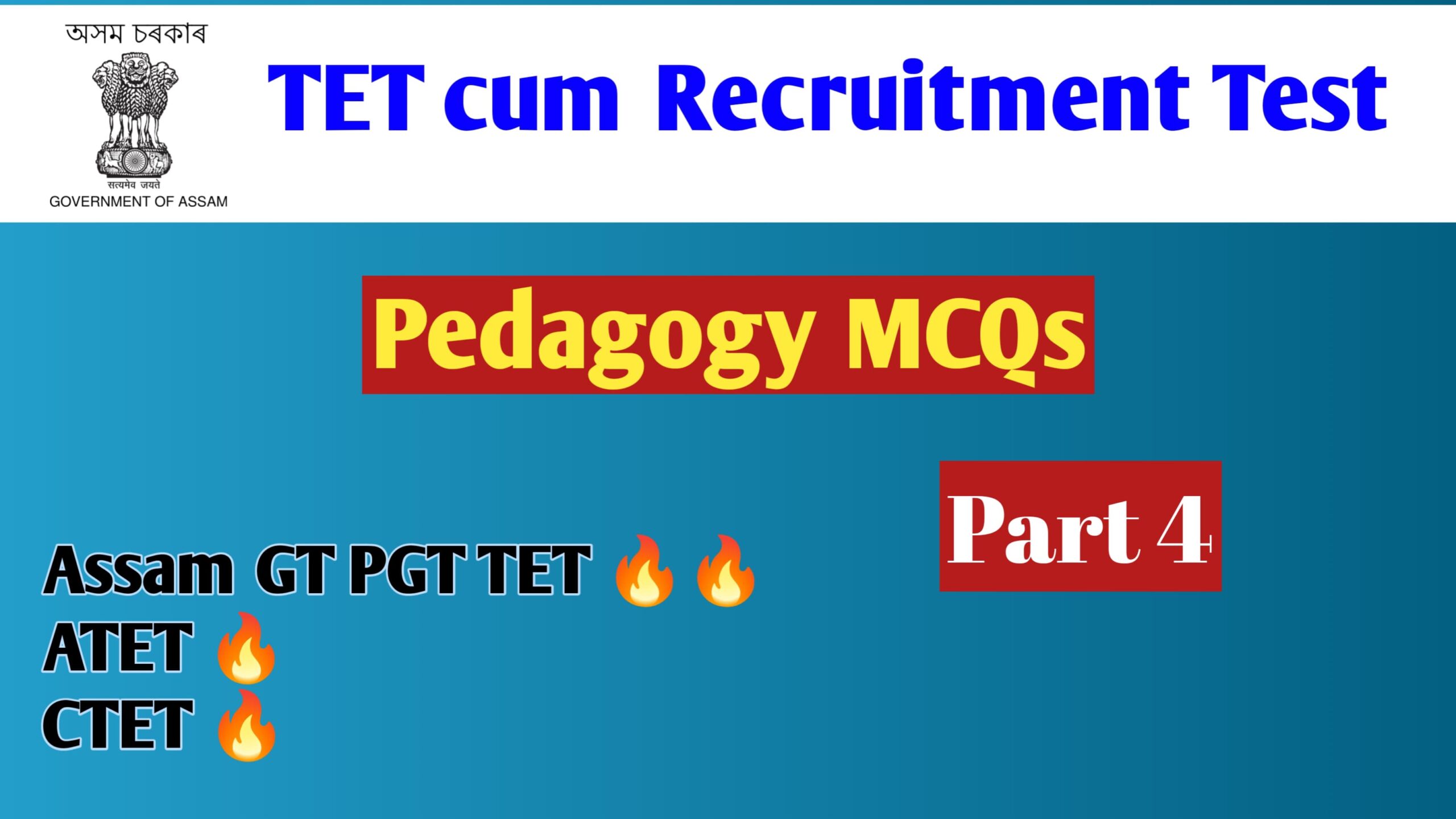Welcome to the Pedagogy MCQs section for Assam TET, GT, and PGT TET, CTET exams. This page is designed to help aspiring teachers enhance their understanding of teaching methodologies, educational psychology, and classroom management through practice questions. Pedagogy is a vital subject for any teaching exam, and practicing MCQs will strengthen your preparation.
Instructions:
- Each question has four options. Choose the correct one.
- You can use these MCQs for practice, revision, or to gain a deeper understanding of Pedagogy.
Pedagogy MCQ Questions:
1.Which of the following is a pre-requisite to learning a language?
(1) Motivation
(2) Habit formation
(3) Imitation
(4) Oral approach
Ans 1
2. Learning a language is a
(1) gradual process
(2) last process
(3) instant process
(4) all inclusive process
Ans 1
3.Which one of the following is considered as a great deterrant to learning English?
(1) Lack of opportunity for the pupils to listen and use English outside the classroom
(2) English is a difficult language to learn
(3) English phonemes are unscrupulous
(4) English has a vast vocabulary
Ans1
4.The children suffer from lack of self-esteem when they are
(1) not allowed to eat what they want
(2) not able to express their feelings through words or language
(3) are not allowed to play with friends
(4) None of the above
Ans 2
5. Language acquisition occurs only when
(1) the child is taught the rules of grammar
(2) the child is given an award
(3) the child has exposure to the language
(4) the child absorbs the language without conscious attention
Ans 3
6. When we sing a rhyme in an English language classroom, we
(1) familiarise the learner with the English sounds
(2) teach them to read
(3) teach learners to understand the words
(4) teach them to learn to sing
Ans 3
7.Which one of the following is not a language component?
(1) Grammar
(2) Speech
(3) Sound system
(4) Manuscript
Ans 4
8. The second language should be taught through
(1) mother tongue and translation
(2) using the target language as much as it is possible
(3) learner background and talent
(4) grammar and rules of language
Ans 2
9. The process of word formation consists of
(1) spelling and compounding
(2) using synonyms or euphemisms
(3) compounding and conversion
(4) conversion and meaning
Ans 4
10. Which learning domain constitutes higher order thinking?
(1) Remembering
(2) Understanding
(3) Application
(4) Evaluation
Ans 3
11. Language is a tool because
(1) it is used for processing ideas
(2) it is used for communication
(3) it is used for thinking
(4) it is used for conveying ideas
Ans 2
12. Which of the following is not a language component?
(1) Sound
(2) Symbols
(3) Vocabulary
(4) Structures
Ans 1
13. The language skills that cannot be assessed through a traditional pen-paper test are
(1) reading and listening
(2) listening and speaking
(3) reading and speaking
(4) writing and listening
Ans 2
14) A speech community refers to a community which
(1) uses different languages
(2) speaks different dialects
(3) speaks the same language
(4) connects by virtue of a link language
Ans 3
15. Role play’ is an activity for promoting
(1) assessment
(2) listening
(3) writing
(4) speaking and listening
Ans 4
16. In order to know the correct pronunciation of English words, the learner should
(1) know how to write the words
(2) know the spelling, meanings and how they are pronounced
(3) know the meanings only
(4) know the spelling
Ans 3
17. Learners find it difficult to apply rules of grammar automatically in listening, speaking, reading and writing because of
(1) lack of declarative knowledge
(2) lack of procedural knowledge
(3) disconnection between declarative and procedural knowledge
(4) None of the above
Ans 3
18. Which of those is central to the teaching and learning of languages?
(1) Listening
(2) Speaking
(3) Grammar
(4) Critical thinking
Ans 3
19) Pedagogical grammar is
(1) learning of rules first and then the meanings of words
(2) learning of meanings through form
(3) learning of grammar in context through use
(4) learning of grammar through prose and poetry
Ans 3
20) Functional grammar refers to
(1) learning grammar by knowing the technicalities of language
(2) learning grammar through the rules of language
(3) learning grammar in isolation
(4) learning grammar in a given context
Ans 4
21) The main objective of remedial teaching in English language is
(1) to develop good habits in pupils
(2) to solve educational difficulties and problems
(3) to remove pupils’ weaknesses
(4) None of the above
Ans 2
22) Remedial teaching is not
(1) re-teaching
(2) motivating
(3) given after diagnostic test
(4) Both (2) and (3)
Ans1
23) Mistakes in language learning should be
(1) taken seriously
(2) eliminated as early as possible
(3) ignored
(4) discussed with parents
Ans 2
24) Some qualities of good English textbook are
(1) good printing with no spelling mistakes
(2) suitable font and size
(3) realistic and interesting subject matter
(4) All of the above
Ans 4
25) Language lab is more helpful for the
(1) pronunciation correction
(2) understanding spoken English
(3) innovative teaching
(4) All of the above
Ans 4
More MCQs:
- Assam General Knowledge MCQ
- Indian History MCQ
Stay Updated
For the latest on Assam Pedagogy and other study resources, keep visiting Assam Board Exam
For More details check our Youtube Channel Assam Board Exam


